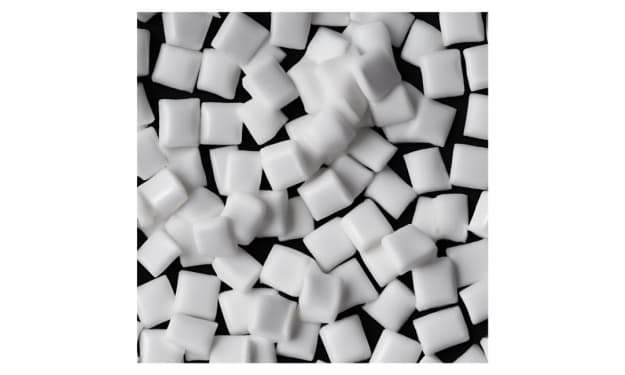The impact of sugar on your body
What occurs when you cease consuming sugar?

The typical American ingests at least half a cup of sugar daily, according to studies. Reports suggest that reducing sugar intake can lead to increased cravings, with some individuals experiencing withdrawal symptoms as a result.
During the initial 24 hours of abstaining from sugar, your body experiences a decrease in blood sugar levels. This prompts the pancreas to release glucagon, a hormone responsible for breaking down glycogen - the body's sugar storage - to provide the necessary energy. The pancreas plays a crucial role in regulating blood sugar levels by releasing insulin when levels are high and glucagon when they are low.Glycogen is tightly bound to 3 grams of water, which explains why the initial loss of water weight is observed within the first 24 hours of abstaining from sugar.
On the second day, fatigue sets in and sugar cravings become apparent as the body seeks alternative energy sources. Gluconeogenesis, the process of converting proteins into sugars, is activated to meet the body's energy demands. Additionally, fats are broken down into ketones for energy production. These metabolic changes can lead to feelings of tiredness, headaches, and sugar cravings. However, the exact reasons behind these effects are not fully understood due to limited human studies.
Animal studies have indicated that the consumption of sugar in rats activates neurochemical pathways that lead to the release of dopamine. Interestingly, in some cases, this effect can be even more powerful than the impact of cocaine on rats. This is why you might have come across sensationalized headlines in popular science articles claiming that sugar is more addictive than cocaine. The reason behind this is that sugar triggers the release of dopamine, which creates a positive reinforcement and can lead to cravings. However, it is important to note that there is no evidence suggesting that humans can become as addicted to sugar as they can to drugs like cocaine.
On the third day of sugar deprivation, individuals may experience a metallic taste in their mouth and unpleasant breath odor. This is due to the breakdown of fat into ketones, which results in the release of acetone in the body. When exhaled, acetone can smell similar to nail polish remover or rotting fruit.
Certain research has indicated that the presence of acetone in one's breath can serve as an indicator of the ketone levels in their bloodstream. This unpleasant breath odor may persist for a period ranging from a few days to several weeks. It is important to note that this phenomenon is observed in individuals who completely eliminate sugar from their diet, including fruits. Specifically, we are interested in exploring the effects of removing added or refined sugars from one's diet between the fifth and tenth day. During this timeframe, a notable transformation occurs in one's taste buds, rendering them more receptive to the taste of sugar.
A study conducted involved participants undergoing a water fast lasting from 5 to 14 days. The study revealed that the ability to detect sweet flavors significantly improved, indicating heightened sensitivity to sugar taste. This outcome is not unexpected, as individuals who regularly consume high amounts of sugar tend to experience a decrease in sensitivity to sweetness, leading them to add more sugar to their food or drinks to perceive the sweet taste once more. Furthermore, after abstaining from sugar for six weeks, individuals may observe a more regular bowel movement pattern, along with reduced bloating and cramps.
IBS affects approximately 10 to 20 percent of the population in North America. It is characterized by a range of symptoms, including diarrhea, constipation, cramps, and bloating. Medical professionals often recommend following a low FODMAP diet, which consists of foods low in fermentable oligosaccharides, disaccharides, monosaccharides, and polyols. This diet focuses on reducing refined sugars and increasing natural sugars. Studies have shown that reducing refined sugars can alleviate IBS symptoms, with noticeable improvements within six weeks. Additionally, after ten weeks of sugar-free eating, you may observe healthier-looking skin, as sugar has been linked to the development of acne lesions.
Clinical trials have demonstrated that within a week of consuming high amounts of sugar, subsequent 10 weeks of following a low sugar diet have resulted in a significant reduction in acne lesions. Furthermore, maintaining a sugar-free diet for a year has shown to improve sleep quality. A study conducted on 53,000 post-menopausal women revealed that a three-year period of low sugar intake was associated with a decrease in insomnia. However, the impact of sugar on sleep remains somewhat controversial, as it is uncertain whether it negatively affects daily sleep patterns. Interestingly, certain studies have even suggested that consuming high amounts of sugar before bedtime can actually enhance sleep. Moreover, after one to five years of abstaining from added sugar, the risk of developing high blood pressure, heart disease, type 2 diabetes, and obesity is significantly reduced.
Excessive consumption of sugar has been linked to a wide range of health conditions, such as various types of cancer, primarily due to its connection with obesity. Awareness on this issue is increasing, with reports indicating that nearly 46 percent of the added sugar in our diets is sourced from soda. In the United States, the consumption of soda has declined over the last decade.
Have you thought about switching to artificial sweeteners instead of sugar? But are you concerned about their safety? Keep reading for more information in upcoming articles.
About the Creator
Enjoyed the story? Support the Creator.
Subscribe for free to receive all their stories in your feed. You could also pledge your support or give them a one-off tip, letting them know you appreciate their work.





Comments
There are no comments for this story
Be the first to respond and start the conversation.